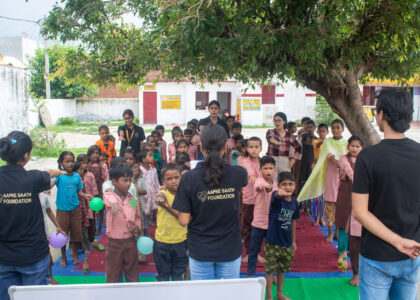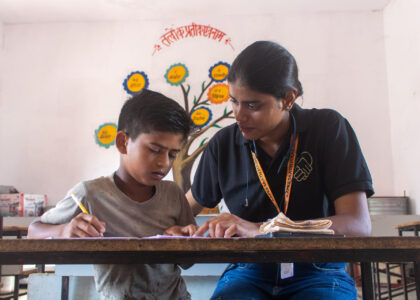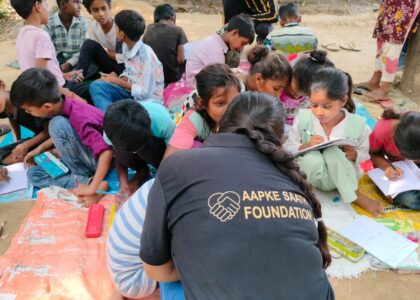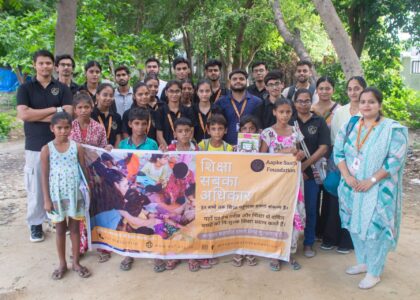Early Childhood Education in India: Importance, Benefits, & Challenges

What is Early Childhood Education?
Early childhood education (ECE) in India refers to learning experiences designed for children from birth to age 8. This stage is crucial for cognitive, social, emotional, and physical development. Investing in early childhood education in India builds a strong foundation for lifelong success.
According to the National Association for the Education of Young Children (NAEYC):
The experiences and programs are designed for young children from birth to age 8 to promote their cognitive, social, emotional, and physical development.
Goals of Early Childhood Education
- Cognitive Development: Enhances curiosity, creativity, and problem-solving skills.
- Social Development: Teaches communication, empathy, and teamwork.
- Emotional Development: Helps children understand and regulate emotions.
- Physical Development: Strengthening motor skills and overall health.
Types of Early Childhood Education Programs in India
- Infant-Toddler Programs (0-3 years)
- Preschool Programs (3-5 years)
- Kindergarten Programs (5-6 years)
- Primary School Programs (6-8 years)
The education of even a small child does not aim at preparing him for school but for life.
– Maria Montessori
Italian physician and educator
Why is Early Childhood Education Important?
1. Cognitive Benefits
- Brain Development: 90% of brain growth happens before age 5.
- Language Skills: Improves vocabulary, communication, and reading skills.
- Problem-Solving: Enhances critical thinking and decision-making.
2. Social Benefits
- Better Social Skills: Encourages sharing, cooperation, and teamwork.
- Emotional Intelligence: Helps with self-awareness and empathy.
- Stronger Friendships: Builds confidence in social interactions.
3. Emotional Benefits
- Self-Regulation: Teaches children to manage emotions and behavior.
- Confidence Boost: Encourages self-esteem and independence.
- Resilience: Helps children handle challenges positively.
4. Physical Benefits
- Motor Skills: Development of balance, coordination, and strength.
- Healthy Lifestyle: Encourages proper nutrition and physical activity.
5. Long-Term Benefits
- Higher Academic Success: Early learners perform better in school.
- Better Career Prospects: Strong ECE leads to better job opportunities.
- Social-Emotional Growth: Prepares children for lifelong relationships and success.
“The first five years have so much to do with how the next 80 years will go.”
– Geoffrey Canada
American educator and social activist
Challenges in Early Childhood Education in India
1. Limited Access & Infrastructure
- Rural vs. Urban Divide: ECE is more accessible in cities than in rural areas.
- Lack of Resources: Many preschools lack proper classrooms, toys, and books.
- Shortage of Trained Teachers: Many educators lack professional ECE training.
2. Financial Barriers
- Insufficient Government Funding: Many programs struggle due to limited support.
- High Cost of Private Schools: Quality education is expensive for low-income families.
3. Lack of Awareness
- Parental Engagement: Many parents are unaware of the benefits.
- Socioeconomic Factors: Poverty and illiteracy hinder early education.
4. Quality Issues
- Inconsistent Standards: Many private institutions do not follow national guidelines.
- Overemphasis on Academics: Play-based learning is often overlooked.
Global Perspective on ECE
According to UNESCO, 1 in 4 children worldwide (35 million out of 137 million) have never attended preschool. Despite proven benefits, only half of all countries offer free pre-primary education.
The UNESCO World Conference on Early Childhood Care and Education (2022) in Tashkent emphasized the need for stronger investment in children from birth to eight years.
The Way Forward for Early Childhood Education in India
Despite progress, India still faces challenges in providing quality early childhood education. To bridge the gap, a combined effort is needed from the government, private sector, NGOs, and communities.
Government Initiatives
- Integrated Child Development Services (ICDS): Expanding services for children under 6 years.
- Sarva Shiksha Abhiyan (SSA): Supporting universal elementary education.
- Poshan 2.0: Enhancing child nutrition and health.
- National Early Childhood Care and Education (NECCE) Policy: Ensuring structured ECE programs.
How Communities Can Help
- National Awareness Campaigns: Educate parents about the importance of ECE.
- Social Media Outreach: Share success stories and impact studies.
- Community Engagement: Organize free workshops and learning sessions.
- NGO Collaborations: Work with nonprofits to expand ECE access.
- Involving Influencers & Celebrities: Use popular figures to advocate for ECE.
Every child deserves access to quality early education. By prioritizing early childhood education in India, we can shape a brighter future for the nation. Investing in early learning leads to stronger communities, economic growth, and a better world for future generations.
Frequently Asked Questions (FAQs)
Early Childhood Education (ECE) refers to structured learning programs for children from birth to age 8. It focuses on cognitive, social, emotional, and physical development to build a strong foundation for lifelong learning.
ECE plays a crucial role in brain development, enhances language and social skills, and improves academic performance. Studies show that children who receive quality ECE have better problem-solving abilities and higher chances of success in life.
ECE provides multiple benefits, including cognitive development, improved communication skills, and emotional intelligence. It also helps children develop motor skills, encourages social interaction, and builds confidence, ultimately leading to academic and professional success.
India offers various ECE programs, including government-run Anganwadi centers, private and public preschools, kindergarten (LKG & UKG), and primary education programs for children aged 6-8. These programs focus on holistic child development through structured and play-based learning.
Despite its importance, ECE in India faces challenges such as limited access in rural areas, high costs of quality education, a shortage of trained teachers, and low parental awareness. Additionally, many schools emphasize rote learning rather than engaging, play-based education.
The Indian government has introduced several schemes to promote ECE, including the Integrated Child Development Services (ICDS), Sarva Shiksha Abhiyan (SSA), National Early Childhood Care and Education (NECCE) Policy, and Poshan 2.0, which aims to improve child nutrition and health.
Enhancing ECE requires better teacher training programs, increased funding for rural schools, awareness campaigns to educate parents, and a shift towards play-based learning methods. Public-private partnerships can also help expand access to quality early education across the country.
Children with access to quality ECE are more likely to perform well in school, secure better jobs, and contribute positively to society. Research suggests that 90% of brain development occurs before age 5, making early learning essential.




